Can I Return Medicines to the Pharmacy?
If you have any questions or concerns in managing your or your family's health, including pain, start with a conversation with your healthcare provider and read your medicine instructions.
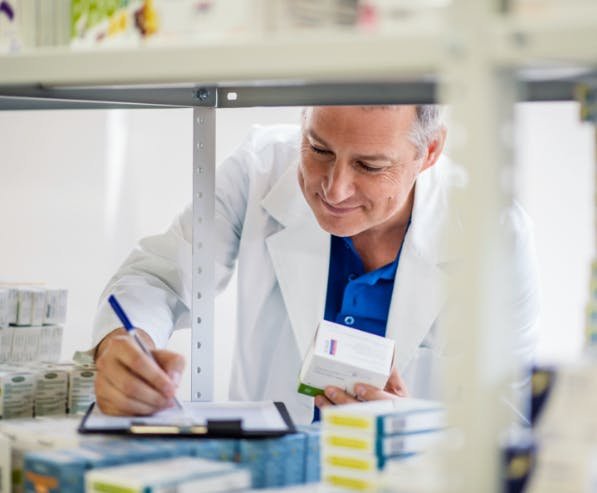
Can I Return Medicines to the Pharmacy?
There’s a right way to store our medicines - but how many of us actually know how to safely dispose of them? When medicine expires, or the packaging becomes damaged, the next step is usually to return your medicines to a pharmacy.
Medicine is specially designed to treat your body so it’s important to treat it carefully when we come to dispose of it. We return unused medicines to protect ourselves and the environment from harm.
From recycling packaging to making sure your old medicine ends up in the right place, learn all you need to know here.
Why is returning medicines important?
- Expired medical products can be risky due to a change in chemical composition. They can become ineffective or cause side effects. Some medications are prone to bacterial contamination, while expired antibiotics may lose potency and lead to serious infections.1
- If you have children or pets at home, expired medicine could be an accident waiting to happen. Even if you’re a stickler for keeping your drugs in a secure place, returning your medicine to the pharmacy can help to put your mind at ease, knowing it’s been safely disposed of.
- Flushing medicines down the toilet can contaminate our water systems. In the same way, medicine packaging should be disposed of properly rather than thrown into general waste bins – this helps to avoid an overflow in our landfills. By returning unused medicines, you’re doing your bit to protect the environment, as well as yourself and those around you.
- Damaged packaging can cause your medicines to expire faster. The seal of bottles, blister packs, tubes, and ampules, prevents the medicine from being exposed to light and air – if broken, the timeline to expiration accelerates, causing the drug to break down and become potentially unsafe. 2 There’s no need for guesswork here – return all medicines with damaged packaging and put those risks behind you!
How do I know when my medicine expires?
- Take some time to read the labels or instruction manuals of your medicines. There will be an expiry date issued by the manufacturer or the pharmacist who prescribed the drugs.
- Some patient information is printed with very small text – so if you struggle with close-up reading, this is a good time to fish out those reading glasses! If you can’t find anything that says ‘expiry’, ‘expires’ or ‘exp date’, try looking for phrases starting with ‘use by’ or ‘use before’.
- Your medicine expiry date will usually be a month of the given year: for example, April 2020. In this case, you shouldn’t take the medicine after the 30th April, 20203 and it’s time to submit those medicines to your pharmacy!
- If you’re worried you’ve accidentally taken expired medicine, in any amount, speak to your healthcare provider as soon as you can for more advice.

1. Sort through your medicine cabinet
It’s widely recommended to check the expiration date of your medicine cabinet every six months. If you’ve noticed some medicine has expired, close it back up into the original packaging. To protect your identity, remove and dispose of any labels with your name on it.
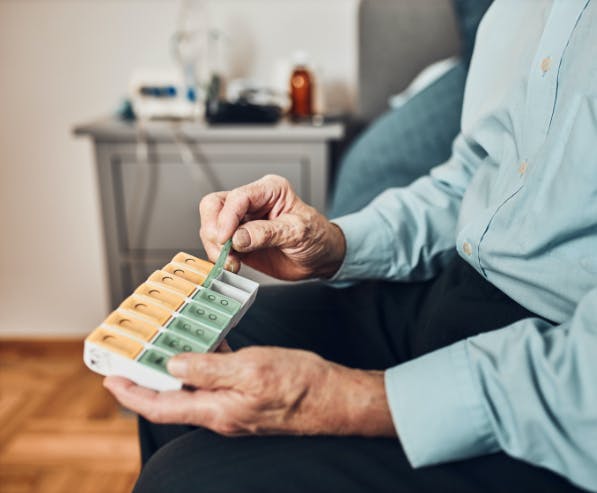
2. Package your medications up
Next, place your medicines in a dry, transparent bag. Choosing a clear bag will help the pharmacist identify the drugs while maintaining social distancing and without needing to physically open the bag.
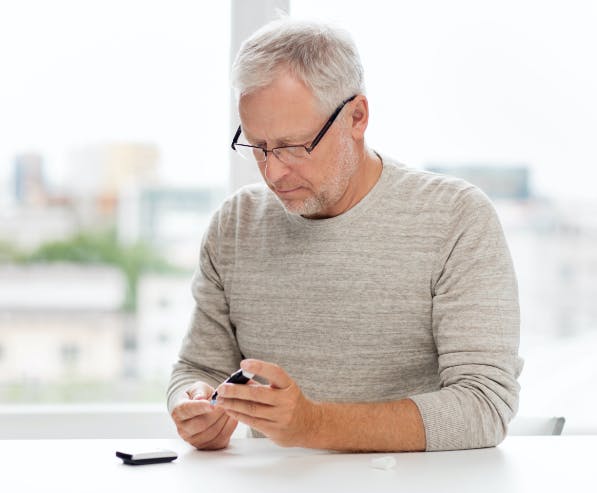
3. Take special care with dangerous medicines
Your pharmacist will have a separate set of procedures when it comes to returning certain medications that are potentially dangerous to others.
If you are returning cytotoxic medicines (usually for anti-cancer treatment) or Controlled Drugs (such as cannabis resin, codeine, or morphine3), there may be more guidelines to follow. Give your pharmacy or doctor a call beforehand to discuss the best plan of action for returning these medicines.
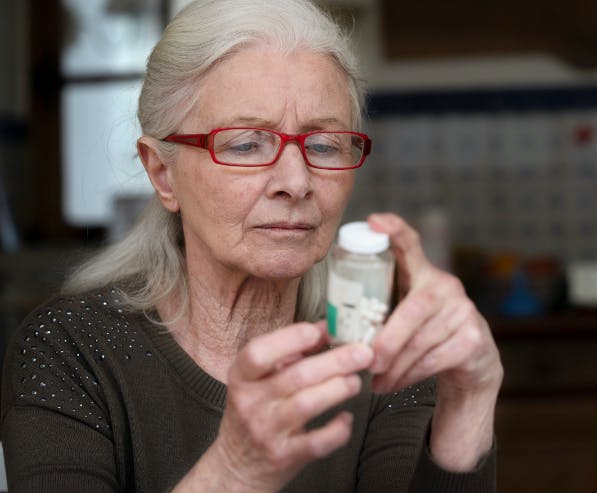
4. Follow COVID-19 guidelines when visiting your pharmacy
IBe sure to follow your local government guidance for COVID-19 when visiting your local pharmacy. You might need to wear a face mask (unless medically exempt from doing so) and/or practise social distancing while returning your medicines.4
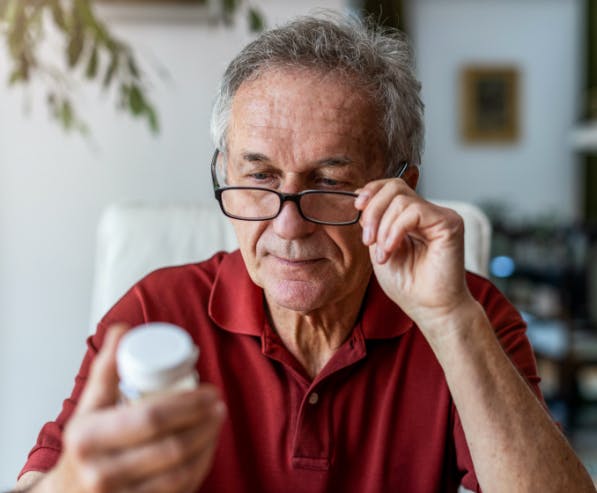
5. Speak to your pharmacist and return your medicine
When called, you can explain which drugs you’re returning. If your medicine was faulty, or damaged upon arrival, tell your pharmacist so they can follow due process and/or issue you a refund.
Your pharmacist will then safely dispose of the medicines – either by sending these back to the manufacturer, recycling, or placing in a hazardous waste bin.
Whatever happens, you’ve done your bit. Give yourself a pat on the back for returning your medicines safely!
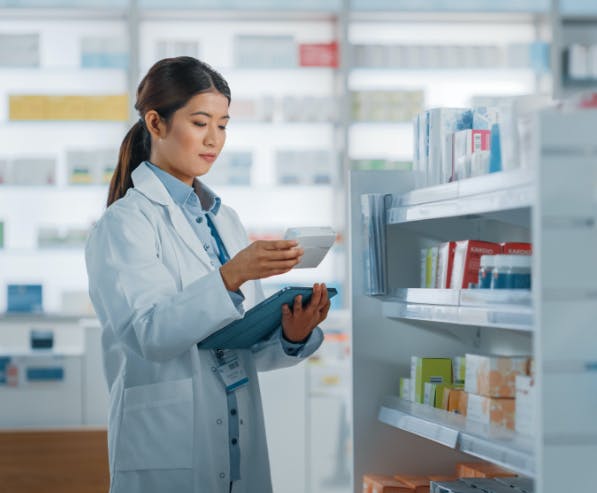
Organising your medicines
Now that you’ve cleared out your medicine cabinet, it’s the perfect time to get organised. Whether it’s painkillers, anti-fungal creams, after-sun, or other medication, a little structure can help you use or dispose of your medicines on time.
- Try using clear containers to store all your remaining medicines, ensuring products remain in their original packaging. Label your containers clearly – either by household member or by type of medication.5
- It’s common to store medicines in the bathroom cabinet, but this isn’t ideal, due to a lot of steam and water being around, which could potentially damage your medicine. A dark, dry, cool place is best for storing medicines.6 Whether this is your kitchen cupboard, bedside table, or dressing table, be sure to keep any dangerous medicines out of reach of children.
- Remember to check the expiry date of your medication regularly and return any damaged or out-of-date medicines safely.
Whatever’s on your mind, we can put it right. Let’s Dispose it right.
SHARE THIS ARTICLE
1 FDA: Don’t be Tempted to Use Expired Medications | https://www.fda.gov/drugs/special-features/dont-be-tempted-use-expired-medicines accessed 28/07/2021
2 The Conversation: Do Drugs Go Off? | https://theconversation.com/do-drugs-go-off-what-happens-to-medicines-after-their-use-by-dates-126878 accessed 28/07/2021
3 NHS: Why Do Medicines Have Expiry Dates | https://www.nhs.uk/common-health-questions/medicines/why-do-medicines-have-expiry-dates/ accessed 28/07/2021
2 NPA: COVID-19 Guidance on Dealing with Patient Returned Medicines | https://www.npa.co.uk/wp-content/uploads/2020/05/COVID-19-guidance-on-dealing-with-patient-returned-medicines-ENGLAND-May-2020.pdf Accessed 24/08/2021
3 GOV UK: Controlled Drug List | https://www.gov.uk/government/publications/controlled-drugs-list--2/list-of-most-commonly-encountered-drugs-currently-controlled-under-the-misuse-of-drugs-legislation accessed 28/07/2021
4 WHO: Questions & Answers Hub | https://www.who.int/emergencies/diseases/novel-coronavirus-2019/question-and-answers-hub/q-a-detail/coronavirus-disease-covid-19 accessed 28/07/2021
5 Stay at Home Mum: How to Organise Your Medicine Cabinet | https://www.stayathomemum.com.au/houseandhome
/organisation/organise-medicine-cabinet/ Accessed 24/08/2021
6 ABC News: Medicine Cabinet is the Worst Place to Store Medicines | https://abcnews.go.com/Health/HealthyLife/medicine-cabinet-worse-place-store-medications-pharmacists/story?id=14316623 Accessed 24/08/2021

Let's treat it right and Panadol
Find out more, including usage and dosage guidance for pain relief treatments, from Panadol.

Let's treat it right and Voltaren
Find out more about the right use of pain relief medicines, including dosing and disposal advice, from Voltaren.



